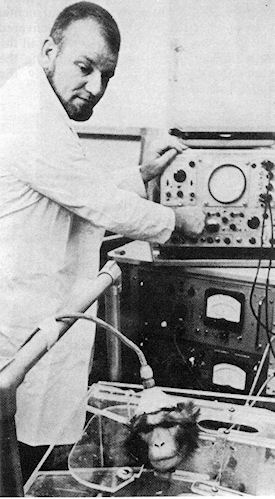THE SCIENCE
Oxford University remains today what it has been for over a century, a centre of vivisection in the U.K., devoted to the ‘animal model’ both in its research and in the education of its students. Its new Biomedical Sciences Building in South Parks Road is a brick and concrete statement to that effect. Tony Blair’s New Labour administration, which backed the building’s construction financially and politically, had promised in its 1997 party-manifesto to set up a commission of enquiry into the validity of vivisection, but this crucial test of worth has never been undertaken. It has therefore been left to individual scientists to challenge the scientific establishment’s addiction to this type of research. Many of these dissenting scientists have visited Oxford to speak at VERO events. This page introduces a few of them, and then provides summaries and links to some key articles in science journals by them and by others.
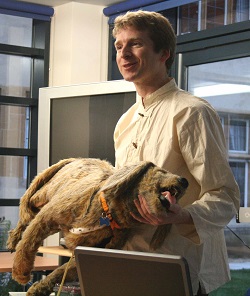 Nick Jukes is Co-ordinator of InterNICHE, the International Network for
Humane Education, which promotes alternatives to the harming of animals in
science education throughout the world. He is co-author of From Guinea
Pig to Computer Mouse (2nd edition 2003, and now regularly updated
on-line), a unique guide for university teachers and students to the
approaches and the technology of a really modern, humane bioscience. In the
photograph, Nick Jukes demonstrates for a VERO audience one such resource:
‘Jerry’, the InterNICHE dog-model for veterinary students.
Nick Jukes is Co-ordinator of InterNICHE, the International Network for
Humane Education, which promotes alternatives to the harming of animals in
science education throughout the world. He is co-author of From Guinea
Pig to Computer Mouse (2nd edition 2003, and now regularly updated
on-line), a unique guide for university teachers and students to the
approaches and the technology of a really modern, humane bioscience. In the
photograph, Nick Jukes demonstrates for a VERO audience one such resource:
‘Jerry’, the InterNICHE dog-model for veterinary students.
Dr Ray Greek is President and Co-founder of Americans for Medical
Advancement. His books include Sacred Cows and Golden Geese: the Human
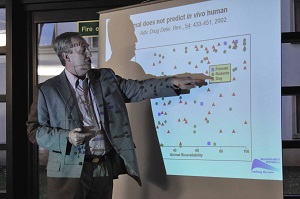 Cost of Experiments on Animals (2000) and Animal Models in Light of
Evolution (2009). Of special interest to non-scientists is a book
co-authored with Professor Niall Shanks, FAQs about the Use of Animals in
Science: a Handbook for the Scientifically Perplexed (2009). In his talk
for VERO, as in his books, he showed the weaknesses of animal-based medical
research, and gave some explanations, professional and financial, for the
injurious addiction to it of the scientific establishment.
Cost of Experiments on Animals (2000) and Animal Models in Light of
Evolution (2009). Of special interest to non-scientists is a book
co-authored with Professor Niall Shanks, FAQs about the Use of Animals in
Science: a Handbook for the Scientifically Perplexed (2009). In his talk
for VERO, as in his books, he showed the weaknesses of animal-based medical
research, and gave some explanations, professional and financial, for the
injurious addiction to it of the scientific establishment.
 Professor Andrew Knight is an academic specialist in animal welfare and
bio-ethics, and the author of The Costs and Benefits of Animal
Experiments (2011). He is an adviser to Animal Consultants
International. He spoke for VERO about his successful campaign, as a
student, to persuade his own university to stop requiring its students to
harm live animals, or to use purpose-killed animals, in its veterinary
science courses. He then offered advice about campaigning for "conscientious
objection" at such places as Oxford University.
Professor Andrew Knight is an academic specialist in animal welfare and
bio-ethics, and the author of The Costs and Benefits of Animal
Experiments (2011). He is an adviser to Animal Consultants
International. He spoke for VERO about his successful campaign, as a
student, to persuade his own university to stop requiring its students to
harm live animals, or to use purpose-killed animals, in its veterinary
science courses. He then offered advice about campaigning for "conscientious
objection" at such places as Oxford University.
André Menache is Director of Antidote Europe, an organisation which campaigns for better human health through human-specific techniques of medical testing and research. He is a vet by training, and has been a leading figure in the science and politics of animal protection for many years – a reminder that a vet might ideally be expected to have the same absolute commitment to the welfare of animals that a doctor is required, by his Hippocratic oath, to have for human health.
Here follows a selection of recent articles in the science journals, written by the above scientists and others, and deconstructing the assumptions and attitudes of the animal-research establishment:
The European Citizens’ Stop Vivisection Initiative and the Revision of
Directive 2010/63/EU
By André Menache
Alternatives to Laboratory Animals 44, no.4, September 2016,
pp.383-90
http://antidote-europe.org/public/ATLA2016.pdf
The ‘Stop Vivisection’ petition, with its 1,173,131 signatures, was one of the first of the European Citizens’ Initiatives to qualify for debate in the European parliament. (For details of the petition and debate, see News and Events page at 11 May 2015). It called for the abrogation of Directive 2010/63, which sets the terms for legal permission of animal research in all the member states. The European Commission subsequently rejected the petition. In this ‘comment’ article, one of the three advocates for the petition before the EU Parliament speaks about the scientific case presented in it, the democratic weaknesses of the ECI system, and the urgent need for the EU to reconsider its loyalty to a failing and unethical research tradition. Now is the right time for that, because Directive 2010/63 has to be reviewed before the end of 2017.
A Discussion of the Role of Complex Evolved Systems in the Development
of Invasive Cardiovascular Interventions
By Dr Ray Greek
Biological Systems 2014, vol.3, issue 1, pp.1-27
http://omicsgroup.org/journals/a-discussion-of-the-role-of-complex-evolved-systems-in-the-development-of-invasive-cardiovascular-interventions-as-illustrated-by-the-blalock-2329-6577.1000124.pdf
It is routinely said by apologists for vivisection that all significant achievements in human medicine have depended upon the preliminary use of animals. This article subjects that claim to thorough historical and critical investigation, using for its examples two important developments in heart surgery. The article is quite long and technical, but whether read in detail or browsed for its more general conclusions, it makes a most important, original and effective challenge to animal-research orthodoxy.
Locating the Middle Ground
By Matthew Simpson
Alternatives to Laboratory Animals, 2014, vol.42, pp.16-17
In the politics of vivisection, people often refer to “the middle ground”, by which they mean an area of ‘moderate’ opinion where the really useful negotiations can occur. But supporters of vivisection tend to use this phrase quite improperly to mean little more than the way of thinking already enshrined in UK law. The phrase is therefore having an anti-progressive effect, which is what this article – published as an opinion piece in the journal Alternatives to Laboratory Animals – aims to correct. [Alternatives to Laboratory Animals and Perspectives in Laboratory Animal Science, which are mentioned in the article, are journals sponsored by the Fund for the Replacement of Animals in Medical Experiments, whose Chairman of Trustees is Professor Michael Balls.]
Open Letter to the CEO of Cancer Research UK
By André Menache
20 January 2014
Cancer Research UK is presently running an aggressive fund-raising campaign, but this letter argues that the money CRUK raises is not being well spent. Up to 95% of cancers are the consequence of life-style or environment, yet CRUK devotes less than 5% of its disposable income to prevention strategies. CRUK overstates the success of the research which it prefers to fund, and it continues to promote cruel and wasteful animal experimentation whose predictive value has frequently been shown to be very poor.
Systematic Reviews of Animal Models: Methodology versus Epistemology
By Ray Greek and André Menache
International
Journal of Medical Sciences 2013, vol.10, pp.206-21
www.medsci.org/v10p0206.pdf
Systematic reviews of published research are a useful way to identify and promote better practice, and, in the case of animal
research, that can mean standardising the best animal welfare. But if their concern is with methodology only, they will do
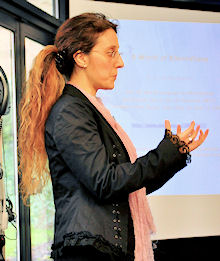 little to correct wrong assumptions about how to get useful knowledge (ie. about epistemology). The authors show that expecting animal models to provide reliable predictions for human therapies is exactly such a wrong assumption.
little to correct wrong assumptions about how to get useful knowledge (ie. about epistemology). The authors show that expecting animal models to provide reliable predictions for human therapies is exactly such a wrong assumption.
REACH, Animal Testing, and the Precautionary Principle
By André Menache and Candida Nastrucci
Medicolegal and Bioethics, 2012:2, pp.13-29
www.dovepress.com/article_10625.t12122009
This is an important assessment of the policies and values of the EU programme called REACH, as they have emerged since its start in 2007. The vital work of this programme in protecting humans and the environment from the almost countless chemical innovations of recent years is in fact being vitiated by (a) its tendency to go for risk management rather than prevention of unnecessary risk, and (b) its reliance on unpredictive animal models. This last is all the more deplorable because the European peoples do not support the use of animals to test industrial, agricultural, and household products, which are REACH’s primary concern.
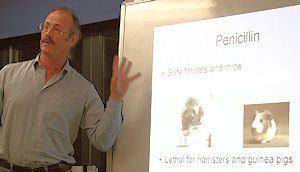 Are Animal Models Relevant in Modern Psychiatry?
Are Animal Models Relevant in Modern Psychiatry?
By André Menache
Psychiatric Times, vol.29 no.3, 28 February 2012
The psychiatric disorders induced in animals make an even more hit and miss approximation to the human conditions they are intended to mimic than do the physiological ones. This article shows why. It also reveals that the notorious cruelties practised by Harry Harlow in his “maternal deprivation” studies of 1957-63 persist in the work of some of his pupils, despite both scientific and ethical objections.
Animal Models in an Age of Personalized Medicine
By Ray Greek, André Menache, and Mark J. Rice
Personalized Medicine, vol.9 no.1, January 2012, pp.47-64
www.futuremedicine.com/doi/abs/10.2217/pme.11.89
The machine-model in physiology, whereby functions were viewed as separable parts, more or less homogeneous across the various species, was successful up to a point, but the stalled supply of new pharmaceutical therapies today shows that the point has long since been reached. The emphasis now must be on dealing with complex systems, differing not only between but also within species. Animal models of human conditions, never much more than accidentally predictive, are now wholly unsuitable and unproductive, as the pharmaceutical companies are recognising, though tied by law to animal testing. This article is an excellent summary of the past and present situations.
An Analysis of the Bateson Review of Research using Non-human Primates
By Ray Greek, Lawrence Hanson, and André Menache
Medicolegal and Bioethics, 2011:1, pp.3-22
www.dovepress.com/an-analysis-of-the-bateson-review-of-research-using-nonhuman-primates-peer-reviewed-article-MB
The Bateson Review, like the Weatherall Report (for which see the Media page here), was commissioned in acknowledgement of particular public concern about the use of monkeys in research. Probably the real intention in both cases was to reassure, rather than to ask subversive questions. In this article, the authors study the composition, assumptions, and methodology of the Bateson panel, and conclude that its published review “resembles an opinion piece written by a group of people with a vested interest in what they are evaluating.”
